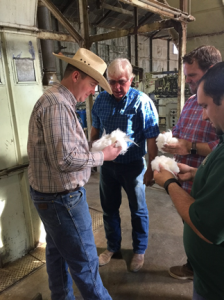CCGGA President/CEO Roger Isom joined forces with California Citrus Mutual, the Nisei Farmers League and the California Independent Oil Marketers Association in meetings with Kern County Supervisors this past week to oppose a Kern County mandate to replace all aboveground storage tanks immediately. Multiple farmers have already received notices of violation and been told to replace all gravity fed aboveground storage tanks and single wall aboveground storage tanks “immediately”. This is being done in response to a change in State Fire Code that the Association has been fighting for the past year. The Association is also leading an effort to introduce legislation to ensure that this mandate is spread over time, instead of immediately. The group met with Supervisors Maggard and Scrivner, and staff from Supervisors Gleason and Perez. The primary purpose was to inform the Supervisors how Kern County was going beyond the law and was the only county in the state doing this at this time. Additional meetings will occur in the coming weeks as we work to find a more reasonable solution.
NEWS & ISSUES
Annual Air Resource Board Truck Registration Due
January is upon us, and while it is time to celebrate the coming of a new year, it also means that vehicle fleets must be registered or updated with the Air Resources Board (ARB). If you are familiar with registering your trucks through the Truck and Bus Reporting System, you will be pleasantly surprised with their newly designed reporting website. If you are unfamiliar with the system, ARB requires that vehicle fleets be reported through their website. The information needed for reporting includes vehicle make and model, vehicle model year, vehicle type, VIN number, and family name of the vehicle. The purpose of the website is to report annual mileage for vehicles used at a specific operation. Agriculture has several exemptions available through the program, including: Ag Mileage Extensions, Ag Specialty Vehicles, Low Mileage Work Truck, and Low-Use Non Operational Vehicles. There are restrictions to the number of vehicles, or number of miles specific vehicles, can be registered under specific exemptions. The Ag Mileage Extension only allows for 5 vehicles to be registered under that exemption, and Low Use Non-Op vehicles are only allowed to travel a couple hundred miles every year at the maximum.
Vehicle fleet registration/update is due by January 31st, so there is plenty of time to get your vehicles updated. If you have any questions with reporting, or would like help getting your vehicles registered, please feel free to contact Director of Technical Services, Chris McGlothlin, at chris@ccgga.org , or give us a call at (559) 252-0684.
California Minimum Wage Set to Increase January 1st
For the second time in the past two years, Californians will be seeing an increase to minimum wage. The first increase saw minimum wage reach $9/hour and took effect July 1st, 2014. This upcoming increase will be to $10/hour effective January 1st. While this minimum wage increase is being applied state wide, cities throughout California are taking it upon themselves to increase minimum wage beyond the signed $10 per hour bill. San Francisco, and some surrounding communities, has agreed to increase minimum wage to $12 per hour by 2015, the City of Sacramento has agreed to increase the minimum wage to $12.50 per hour by 2020, and Los Angeles City Council approved a measure to increase minimum wage to $15 per hour by 2020. These increases are having negative effects on various industries, with some business owners being forced to reduce staff in order to pay for minimum wage hikes. The unfortunate news is that the increases are not over. There are currently two ballot measures asking voters to approve a $15 per hour, statewide minimum wage. Stay tuned for more wage updates in the upcoming year.
Ready Or Not – New Laws Affecting Employer
As the New Year is upon us, so are numerous new laws, not the least of which is a minimum wage increase to $10 per hour effective January 1st. But there are several other laws that you should be aware of and our labor attorneys, the Saqui Law Group have summarized these here. As always, we will be covering these in detail at our annual Safety and Labor Summits and coming webinars throughout the year. For details on these new laws, please click here: Ready Or Not New Laws Affecting Employers
Funeral Services for Ron Nimmo
Funeral services will be held tomorrow, Wednesday, December 30th at 1:30 pm at the Phipps Dale Funeral Home located at 420 West D Street in Lemoore. Graveside services will immediately follow at the Grangeville Cemetery located at 10428 14th Avenue in Armona. In lieu of flowers, remembrances can be sent to the American Cancer Society.
Pacific Ginning Co. Gin Manager Ron Nimmo Passes Away
On December 26th, Pacific Ginning Co. Gin Manager Ron Nimmo passed away after a long battle with cancer. Ron was a board member and past Chairman of the California Cotton Ginners Association. Ron started his career with Producer’s Cotton Oil. He began as a night ginner at Pleasant Valley Gin in Coalinga. From there he moved to Tranquillity under Jack Lyons, also as the night ginner. He was then promoted to day ginner at Mesa Gin and then moved to Westhaven Gin, a gin that would have later significance. He then became a field electrician and later went into business for himself, opening an auto repair & electric shop. He returned to the cotton industry working as a ginner for Westhaven Cotton Company and Stone Land Company and eventually became the Gin Manager running the former Producers gin. His career was just getting started at this time. Over the last several years Ron has continued in his service as a Director of the California Cotton Ginners Association, and served on several committees even after he left Westhaven Gin to work in the Solar Industry and subsequently came back as a gin manager for County Line Gin. Ron later went to work for the Pacific Ginning Company where he has been ever since. Ron was Chairman of the California Cotton Ginners Association from 2011 to 2012, and received the Ginner of the Year Award from the California Cotton Ginners Association in 2011. Ron has been called an “innovator” and a “wonderful person and friend” by his colleagues. Truer words were never spoken. He will be sorely missed by this Association, his colleagues and the entire cotton industry in California.
Air District Receives Nearly $6 Million in Federal Grant Funding
The Valley Air District will augment its highly successful grant program with an additional nearly $6 million in U.S. Environmental Protection Agency (US EPA) funding to replace old agricultural tractors and dirty residential wood burning devices. “Grant funds such as these recognize the hard work and sacrifice being made by Valley farmers, businesses and residents to expedite emission reductions in the San Joaquin Valley,” stated Seyed Sadredin, Executive Director and Air Pollution Control Officer of the San Joaquin Valley Air Pollution Control District. “With these funds the EPA is acknowledging the unique challenges of the Valley and providing much needed financial assistance.” The nearly $6 million in funding being announced today is from two federal grant programs; the Targeted Air Shed Grant Program and the Diesel Emission Reduction Act (DERA) Grant Program. “With this financial assistance, EPA and San Joaquin Valley farmers are working together to improve air quality and promote the use of clean, cutting-edge tractors,” said Jared Blumenfeld, EPA’s Regional Administrator for the Pacific Southwest. An additional $2,483,607 of the Targeted Air Shed Grant Program funding will be spent on replacing approximately 187 agricultural tractors under the District’s very successful Tractor Replacement Program. This funding will reduce an estimated 699 tons of Nitrogen Oxides (NOx) emissions and 139 tons of PM emissions over the project lifetime of 10 years. The District also received an additional $1 million from the DERA program. The $1 million will fund the replacement of approximately 75 agricultural tractors and is estimated to reduce 169 tons of NOx emissions and 28 tons of PM emissions over the project lifetime of 10 years. The Association was also recognized for its contributions and assistance in the funding effort at a press conference at the San Joaquin Valley Air Pollution Control District today.
Assemblyman Quirk Visits the Valley
The Association hosted Assemblyman Bill Quirk on a tour of the farm of California Cotton Growers Association Director Cannon Michael of Bowles Farming and with California Cotton Ginners Association Director Mike Davis of Dos Palos Cooperative Gin. Assemblyman Quirk represents the 20th Assembly District which covers the communities of Hayward, Ashland, Castro Valley, Cherryland, Fairview, Fremont, Pleasanton, San Lorenzo, Sunsol and Union City. Assemblyman Quirk is a very active legislator as he is the Chairman of the Public Safety Committee, and also sits on the Agriculture, Appropriations, Revenue and Taxation Committees, as well as the Utilities and Commerce Committee. Accompanying the Assemblyman from the Association was President/CEO Roger Isom and Director of Technical Services Christopher McGlothlin. This is part of the ongoing effort of the Association to reach out to urban legislators to educate and inform them on the critical issues facing the cotton industry.
Assemblyman Mathis Tour Gin and Farm
The Association hosted a tour this past week for Assemblyman Devon Mathis of the 26th Assembly District. The Assemblyman represents Inyo County and large parts of Tulare and Kern Counties, including the cities of Bakersfield, Delano, Dinuba, Hanford, Lindsay, Tulare, Porterville and Visalia. On this trip, the Assemblyman visited a cotton field, and cotton gin with Association Board Member Stan Creelman, of Mid Valley Cotton Growers, and met with Growers Association Chairman Steve Wilbur at his cotton field southwest of Tulare. Water and regulatory impacts were among the topics covered and the Assembly even had an opportunity to ride in the cotton picker. Assemblyman Mathis is the Vice chairman of the Veterans Affairs Committee and also sits on the Agriculture, Aging and Long Term Care, and Water, Parks and Wildlife Committees. Accompanying the Assemblyman on the tour were the Association’s President/CEO Roger Isom.
Sixth Circuit Issues Stay on Federal Water Regulation Rule
Today, a federal appeals court issued a nationwide stay blocking the new Environmental Protection Agency regulation that seeks to expand the amount of water and wetlands under federal protection, known as “Water of the United States” or WOTUS. The Cincinnati-based U.S. Circuit Court of Appeals for the Sixth Circuit, in a split ruling, said it was prudent to block the regulation while litigation continued over whether the Obama administration’s effort was legal. “A stay temporarily silences the whirlwind of confusion that springs from uncertainty about the requirements of the new rule and whether they will survive legal testing,” the court said. Previously, a federal judge in August blocked the rule in 13 states that had challenged it in a federal court in North Dakota, saying those states were likely to succeed in their lawsuit against the regulation. In coordination with the U.S. Army Corps of Engineers, the EPA in May issued the rule, which is estimated to put about 3% more waterways throughout the U.S. under new federal jurisdiction, which would require a federal permit to pollute those waters and could restrict access altogether. Major waterways, like most rivers and lakes, are already under protection of the Clean Water Act and aren’t affected by the rule. The EPA has said the rule is necessary to clarify which waters should fall under the protection of the federal Clean Water Act of 1972 after two Supreme Court rulings, in 2001 and 2006, called into question whether and to what extent 60% of U.S. waterways, especially streams and wetlands, should fall under federal jurisdiction.

